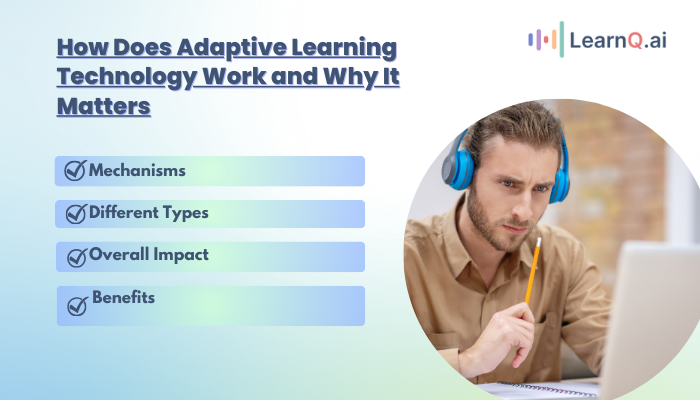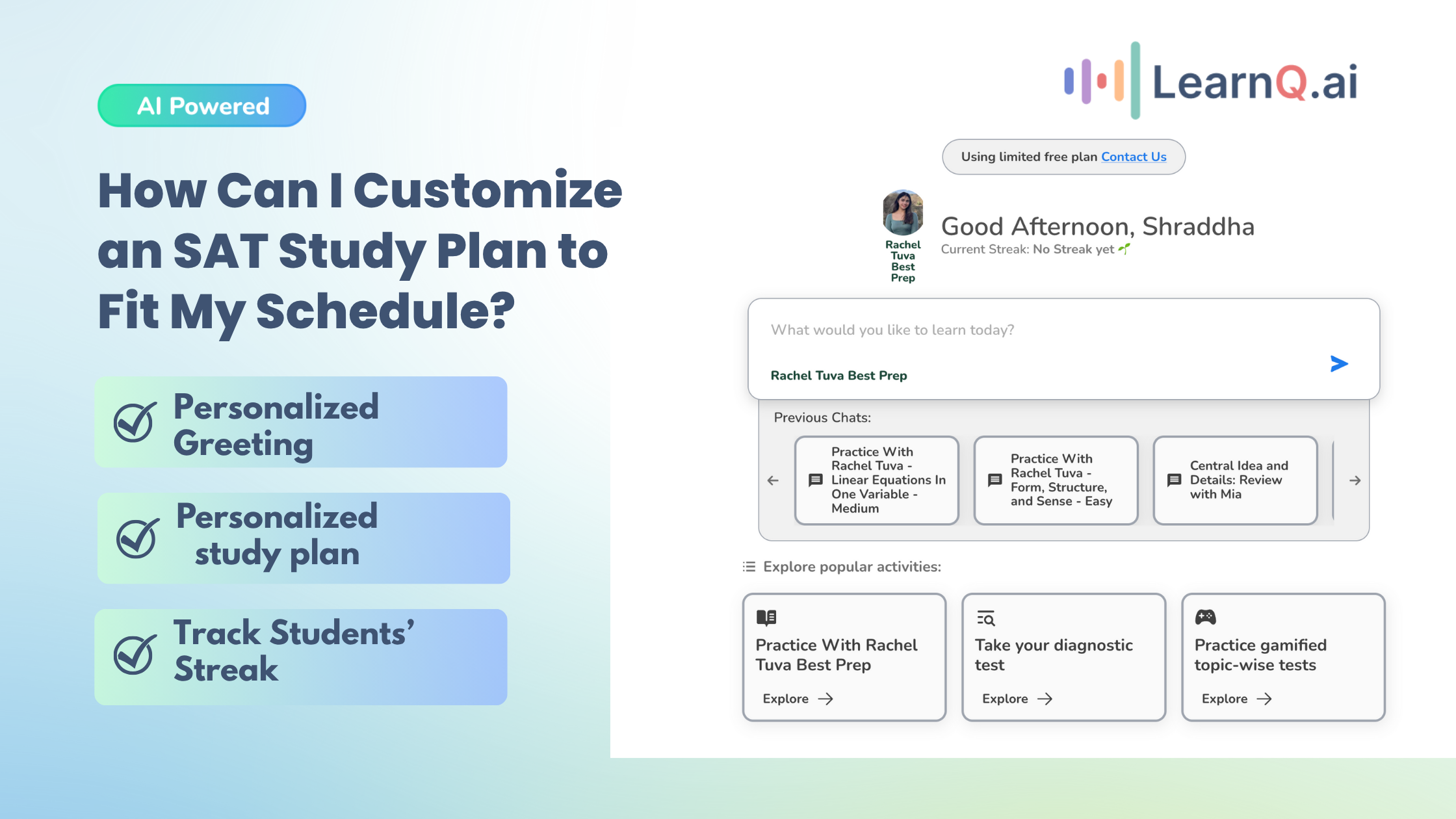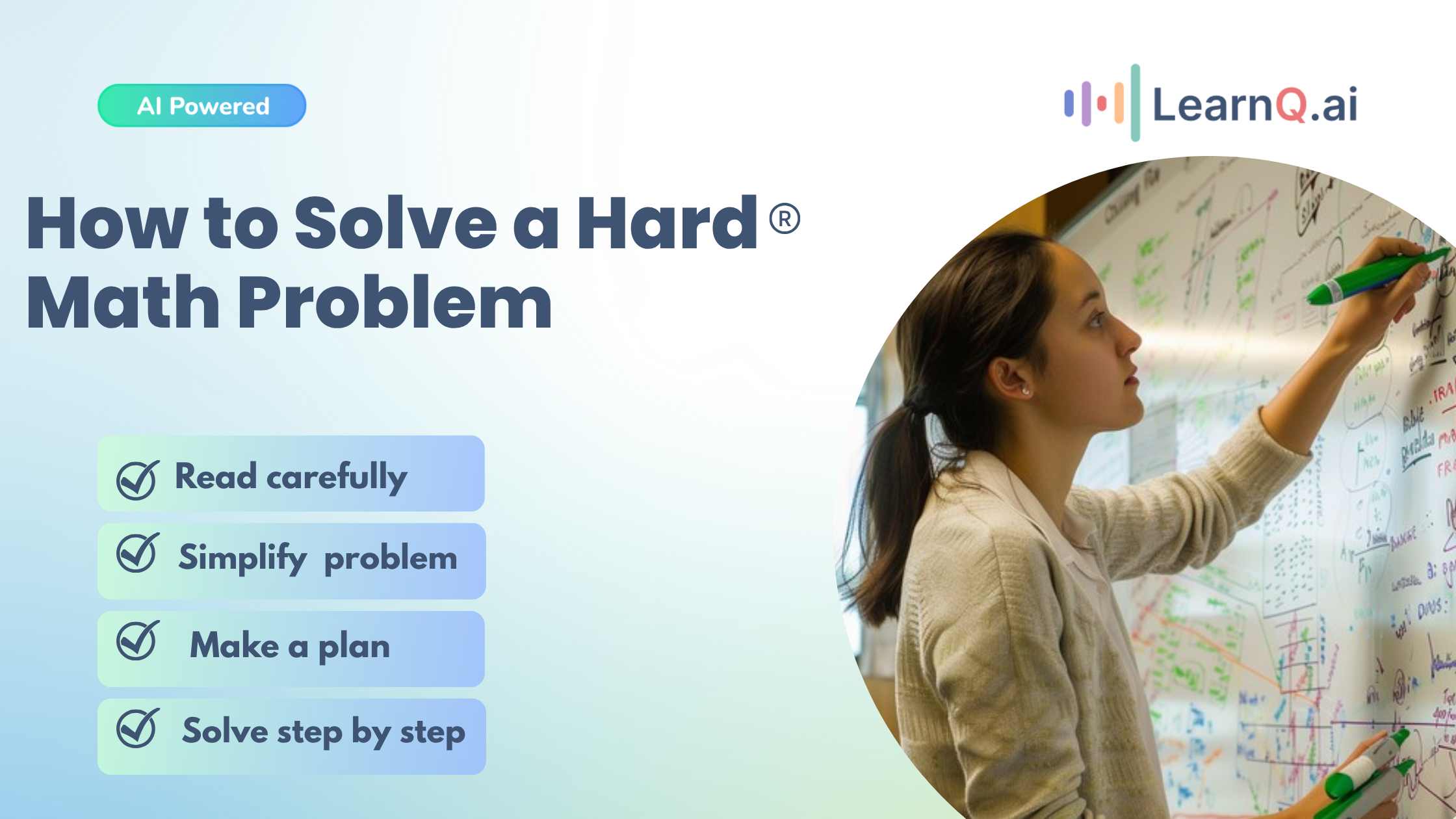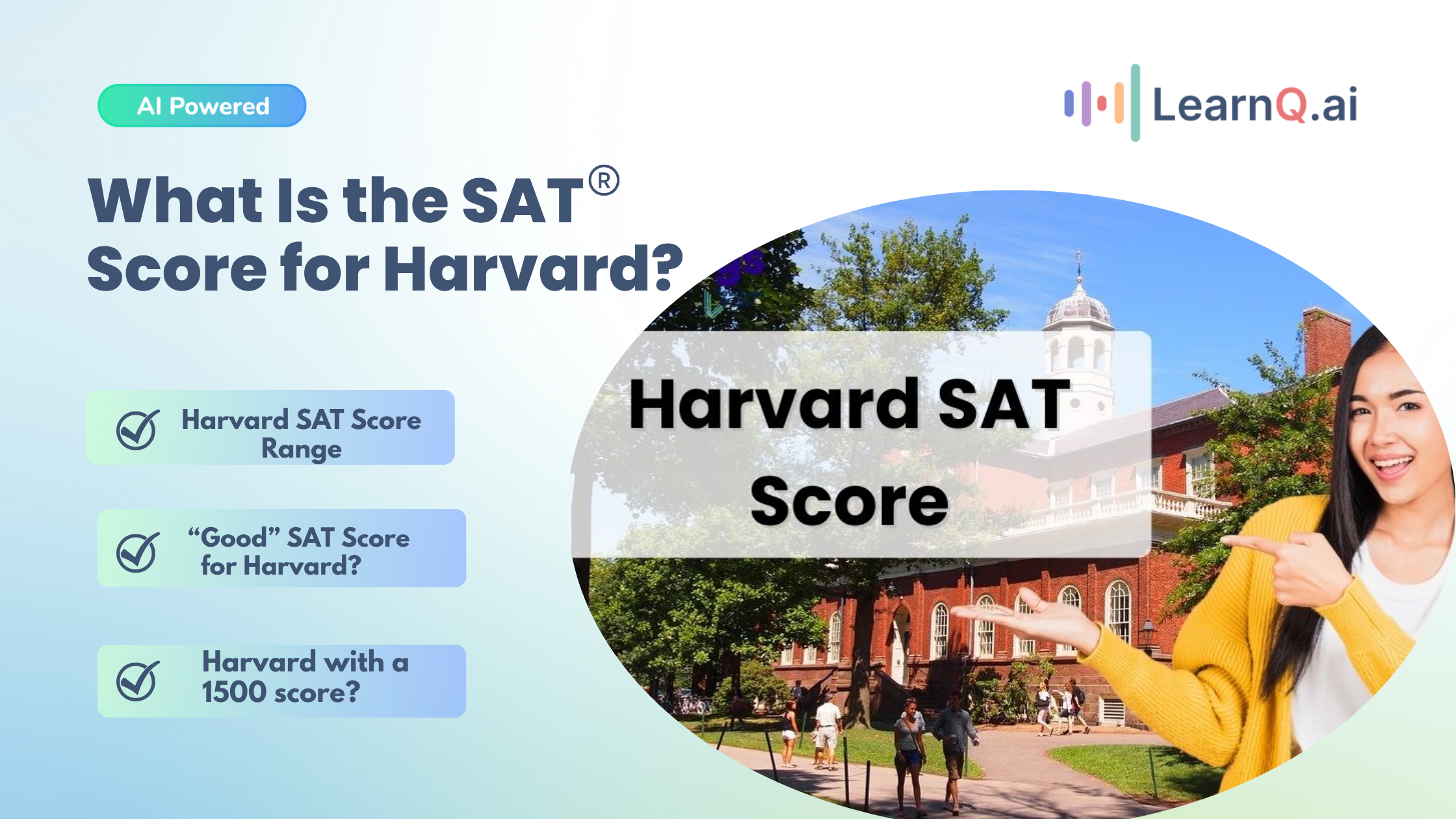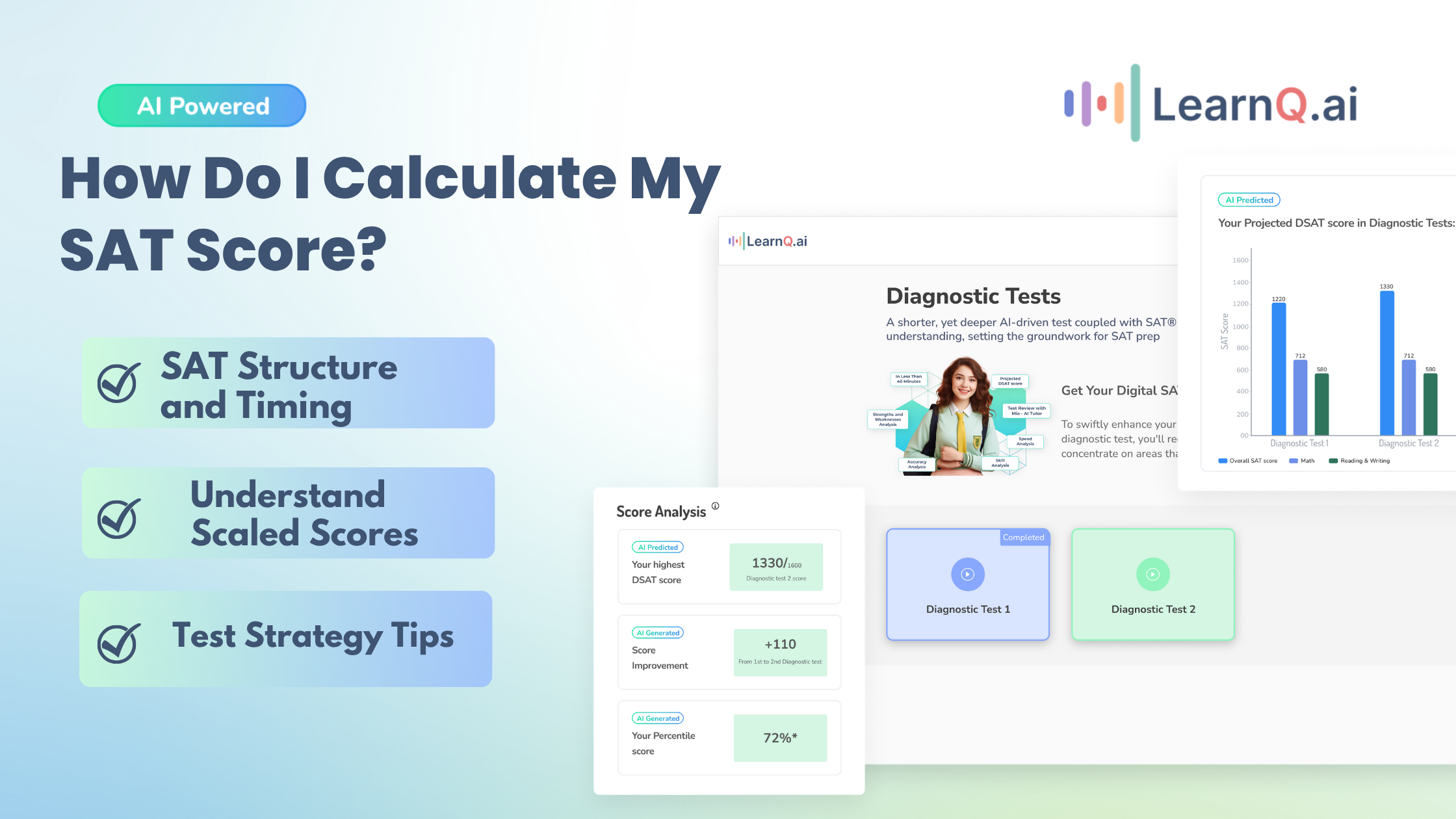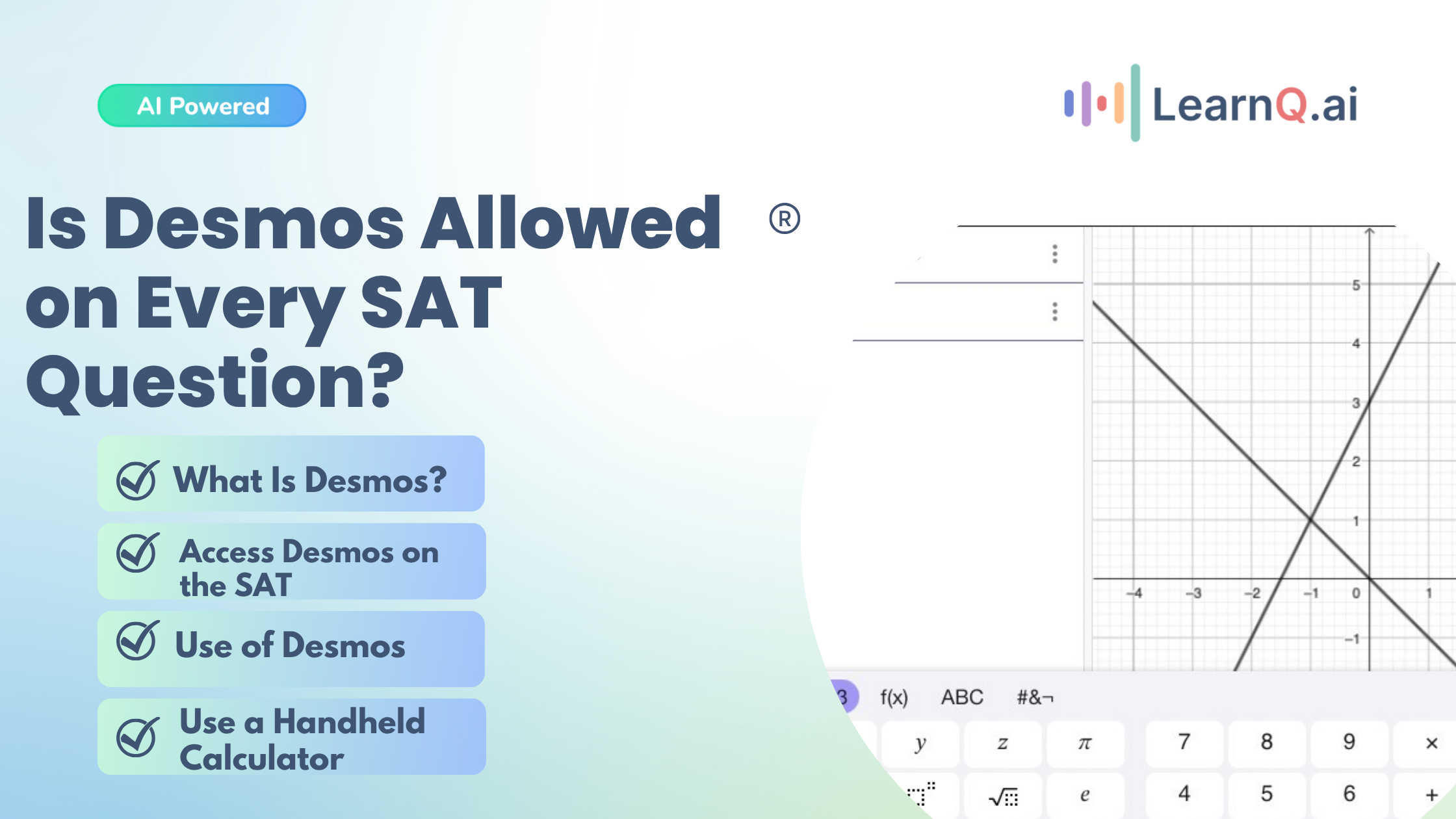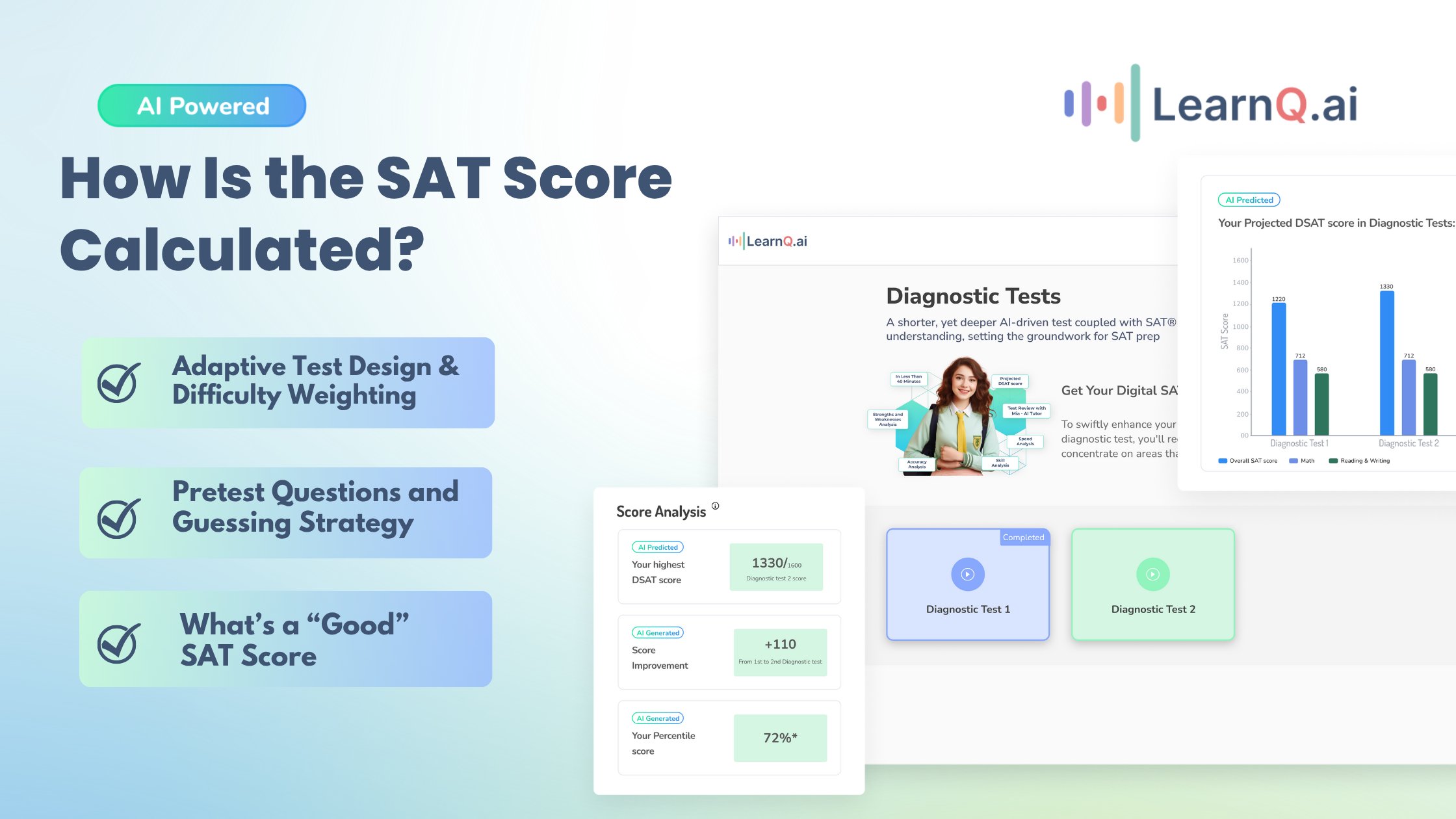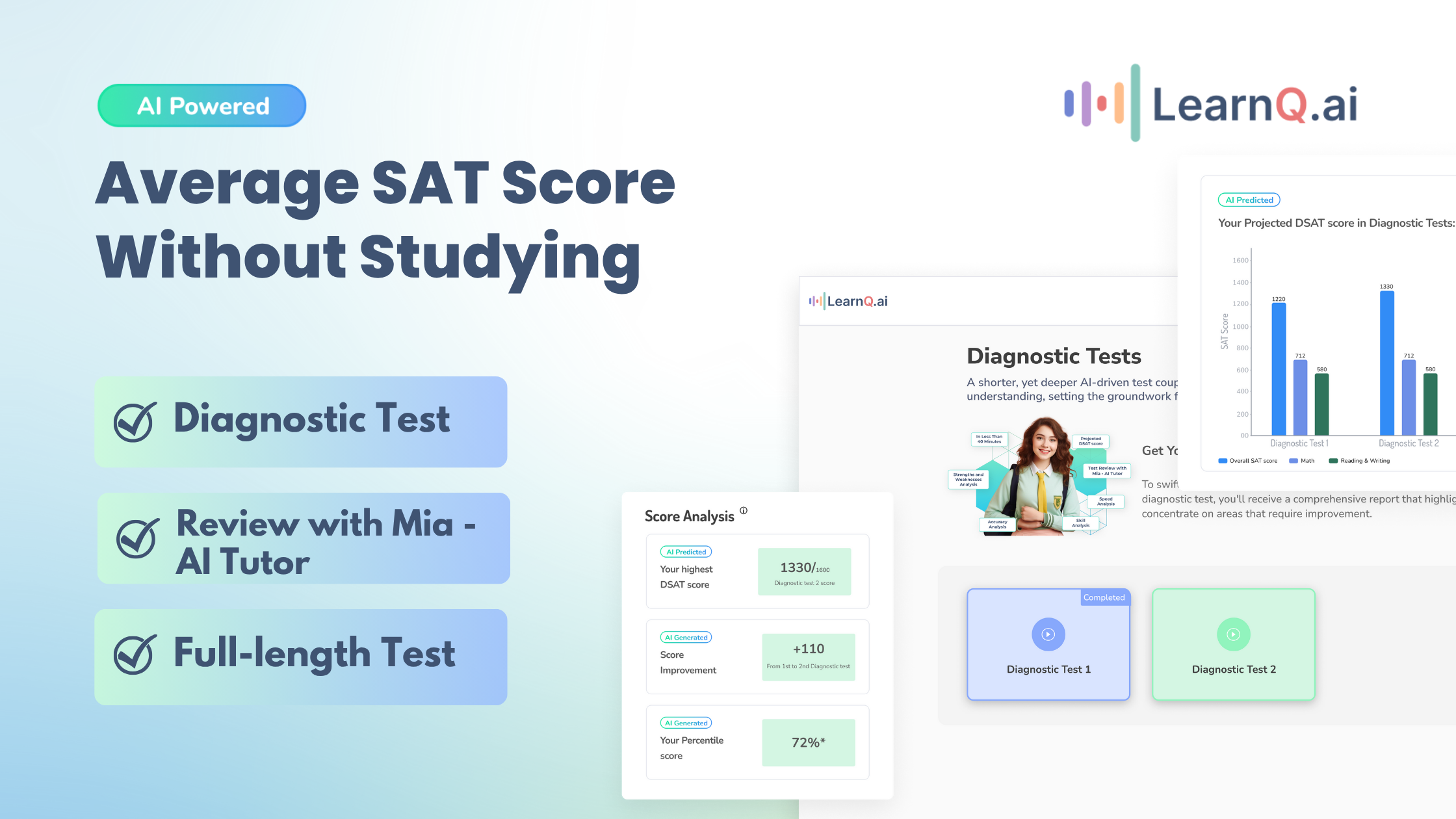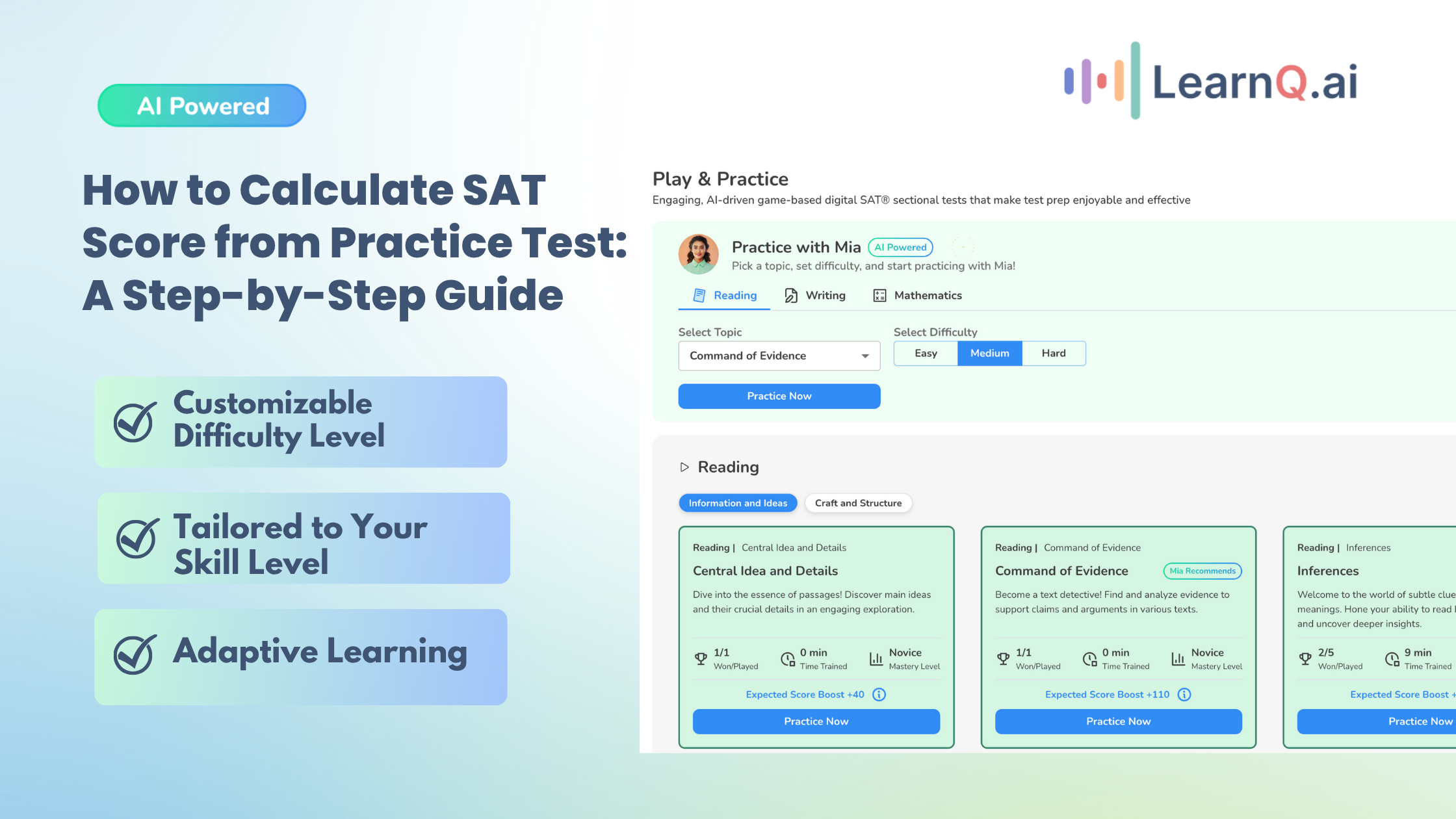Imagine a classroom that caters to every student’s unique learning style and pace. No more feeling lost in the crowd or bored by repetitive lessons. This isn’t science fiction – it’s the reality of adaptive learning technology.
Standardized testing is evolving with the introduction of adaptive learning technology. One significant example is its use in the digital SAT, where this technology is transforming how students prepare for and take the test. Unlike traditional testing methods, adaptive learning adjusts to the student’s ability level in real time, providing a more personalized and accurate assessment of their skills and knowledge.
LearnQ.ai is Powered by VEGA AI—Is your Institute Next?
Give students a Duolingo-style test-prep platform with Shopify-level customization for tutors and institutes.
As education continues to advance in the digital age, it is essential to understand how adaptive learning technology works in favor of the digital SAT. In the following sections, we will explore how adaptive learning works and its significant implications for the future of standardized testing.
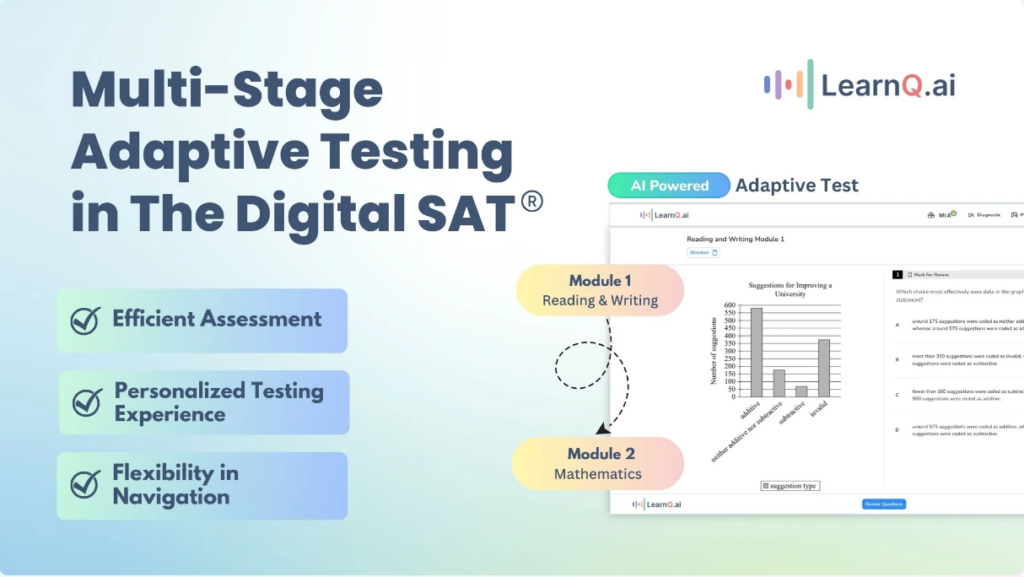
What is Adaptive Learning Technology and Why Does it Matter?
Adaptive learning technology customizes your testing experience. Instead of facing a standard set of questions, the difficulty changes based on your performance. If you answer a question correctly, the test gives you a harder one to better assess your skills.
The Mechanisms Behind Adaptive Learning Technology
Adaptive learning technology is a game-changer in the educational landscape, especially for standardized tests like the digital SAT. This technology personalizes the learning experience by adjusting the difficulty of questions based on a student’s performance in real time. Here’s an in-depth look at the mechanisms behind this innovative approach, including how platforms like LearnQ.ai utilize this technology:
Real-Time Data Collection and Analysis
Adaptive learning systems continuously collect data on a student’s performance as they answer questions. Each response is analyzed to determine the student’s proficiency in specific areas. For example, if a student answers a series of algebra questions correctly, the system recognizes this proficiency and adjusts the subsequent questions to a higher difficulty level. On the other hand, if the student struggles with a particular topic, the system will present more questions at the appropriate difficulty level.
Enhance your Digital SAT study routine with AI-driven insights and personalized practice tests.
LearnQ’s Advantage:
Through adaptive practice tests offered by platforms like LearnQ.ai, a student might start with an easy math question. If the student answers correctly, the next question will be slightly more challenging. This dynamic adjustment ensures that the student is consistently challenged at an appropriate level, maximizing their learning efficiency.
Personalized Learning Paths
One of the standout features of adaptive learning technology is its ability to create personalized learning paths. Based on the initial assessment and ongoing performance, the system can identify a student’s strengths and weaknesses. It then tailors the content and exercises to focus more on areas that need improvement.
Immediate Feedback and Adjustments
Adaptive learning technologies provide immediate feedback to students, allowing them to understand their mistakes and learn from them instantly. This immediate correction helps students learn the right information and avoid making the same mistakes again.
Engagement and Motivation
Adaptive learning systems often incorporate gamification elements to keep students engaged and motivated. By setting achievable goals and providing rewards for progress, these systems make the learning process more enjoyable and encouraging.
Types of Adaptivity in Learning
Adaptivity in learning refers to the ability of educational tools to adjust and respond to the needs of each learner. This personalized approach is especially valuable in the context of the Digital SAT, where different students have varying strengths and weaknesses. Below are the main types of adaptivity in learning, and how LearnQ.ai leverages these methods to enhance student performance.
Content Adaptivity
Content adaptivity involves adjusting the learning material based on the student’s progress and performance. For example, if a student consistently struggles with algebra, the system will provide additional practice problems and instructional content focused on algebra. LearnQ.ai excels in this by using advanced algorithms to tailor content to each student’s specific needs, ensuring they spend more time on areas to improve.
Assessment Adaptivity
Assessment adaptivity means modifying the difficulty level of questions based on the student’s performance in real time. This type of adaptivity ensures that students are continually challenged but not overwhelmed. LearnQ.ai uses adaptive assessment techniques to adjust the difficulty of SAT practice questions, helping students build confidence and skills progressively.
Feedback Adaptivity
Adaptive learning systems provide personalized feedback based on the student’s responses. This type of adaptivity helps students understand their mistakes and learn from them effectively. LearnQ.ai offers detailed, adaptive feedback that not only points out errors but also explains why an answer is incorrect and how to approach similar problems in the future.
Pace Adaptivity
Pace adaptivity involves adjusting the speed of content delivery to match the student’s learning pace. Some students may grasp certain concepts quickly, while others may need more time. LearnQ.ai adapts the pace of learning to ensure that each student can learn effectively without feeling rushed or bored.
Incorporating these types of adaptivity, LearnQ.ai provides a comprehensive, personalized learning experience that maximizes student performance on the Digital SAT. By leveraging advanced technology and adaptive learning strategies, LearnQ.ai helps students overcome their challenges and succeed in their SAT preparation.
Also Read, What is SAT Adaptive Testing All About in the Digital SAT?
The Impact of Adaptive Learning Technology on Education
Standardized tests like the SAT used to be one-size-fits-all, but new technology is changing the game! This new technology, called adaptive learning, personalizes how you learn for the SAT. It figures out what you’re good at and what needs work, then focuses on improving your weaknesses. Let’s see how adaptive learning makes studying for the digital SAT more effective, and how LearnQ.ai is leading the charge in this revolution.
Personalized Learning Experience
One of the most profound impacts of adaptive learning technology is the creation of a personalized learning experience. Traditional SAT prep methods often follow a one-size-fits-all approach, which may not approach the unique needs of each student.
Platforms like LearnQ.ai track a student’s performance in real time, identifying areas where they excel and where they need more practice. This personalized approach ensures that each student focuses on their specific areas of improvement, making their study sessions more efficient and effective.
Efficient Use of Study Time
Adaptive learning technology helps students make the most efficient use of their study time. By focusing on the areas that need the most attention, students can avoid wasting time on concepts they already understand.
Instead of spending hours on generalized practice, a student using LearnQ.ai will receive targeted exercises that address their weaknesses. This efficient use of study time leads to more significant improvements in a shorter period.
Improved Test Performance
The personalized and efficient approach of adaptive learning technology often translates into improved test performance. By continually adapting to the student’s needs, this technology ensures that students are well-prepared for the types of questions they will encounter on the Digital SAT. Adaptive learning platforms like LearnQ.ai provide an AI tutor called Mia to solve all your doubts by being available 24/7.
Want to know more about Mia? Click here
The Benefits of Adaptive Learning Technology
Adaptive learning technology isn’t just about making the test feel more engaging. Here are some of the solid ways it benefits you:
A More Accurate Assessment:
Adaptive learning ensures you’re challenged appropriately, leading to a more accurate reflection of your true abilities.
No more wasting time on questions that are way above or below your skill level. The adaptive approach streamlines the test, allowing you to finish faster and potentially reducing test anxiety and fatigue.
Taking Control of Your Test Prep with Adaptive Learning
There’s no substitute for putting in the practice hours. Fortunately, there are amazing resources available, like LearnQ.ai. The platform utilizes adaptive learning technology to create a personalized study plan that targets your weaknesses and helps you achieve your target score. While the format is digital, the core skills tested on the SAT remain the same – critical reading, writing, and math. Make sure to solidify your foundation in these areas as you navigate your adaptive learning practice.
The Future of Adaptive Learning Technology
Adaptive learning technology is continuously evolving, promising exciting developments for the future. As the SAT evolves, adaptive learning will play a crucial role. Here’s what we can expect:
Focus on Skill Development
Future SAT exams might move beyond testing just knowledge. They could assess your ability to learn and apply concepts, requiring solutions to complex problems rather than just selecting multiple-choice answers.
Enhance your Digital SAT study routine with AI-driven insights and personalized practice tests.
Integration with Other Technologies
We can expect adaptive learning to integrate with other emerging technologies, such as artificial intelligence and virtual reality. This integration will create more immersive and engaging learning environments
The future of adaptive learning technology looks promising, with significant advancements that will make test preparation more effective and personalized. LearnQ.ai is at the forefront of these developments, ensuring students are well-prepared for the evolving demands of the SAT.
LearnQ.ai is powered by VEGA AI—Is your institute next?
Offer students a Duolingo-style test-prep platform with Shopify-level customization for tutors and institutes.






Conclusion
The digital SAT with adaptive learning technology is a significant leap forward. It creates a more personalized testing experience, allowing you to showcase your skills more effectively. By embracing adaptive learning technology and using resources like LearnQ.ai, you can take control of your test prep journey and approach the digital SAT with confidence. With the guidance of adaptive learning, you can optimize your study time, maximize your learning efficiency, and build the confidence you need to approach the digital SAT with a positive mindset.

